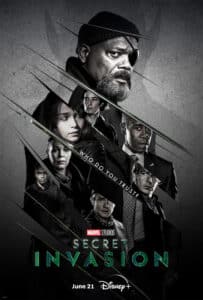
Secret Invasion
Nick Fury has been away from Earth for a long time, on the S.A.B.E.R. space station, and the Skrull refugees he found refuge in in the 1990s still live among us. Not only that: more and more shape-shifting aliens have found asylum on our planet, but in these three decades they have not seen a way out of their condition and some of them have become radicalized. Led by Gravik, they intend to unleash a nuclear war to take possession of the planet thanks to their natural resistance to radiation. Together with Talos, his Skrull friend, worried about his daughter who has joined Gravik’s faction, Nick Fury will have to try to stem the conspiracy. English espionage also operates against the aliens, led by the eccentric and ruthless Sonya Falsworth.
In their ninth TV series, Marvel Studios tries again with Secret Invasion to raise the target towards a more adult audience, but once again they lack the conviction to hit the target.
It is a script that we have already seen with Moon Knight, but here the reasons for failure are different: this time we don’t look at horror and we don’t make the mistake of delving into fantasy, we instead focus on espionage, but with excessive fear . There are many Marvel comic series that successfully embrace the genre, but do so without inhibiting too much of the typical superhero action – as seen in the cinema with Captain America: The Winter Soldier. In Secret Invasion, however, it seems that an attempt was made to conquer a different audience by limiting production values, with a sometimes cheap effect.
This cost-saving choice could also have paid off… if there were someone writing with the subtlety of John le Carré or the brilliance of Mick Herron. The good Kyle Bradstreet, screenwriter of some episodes of Mr. Robot and therefore a professional who is not without his craft, however does not have these qualities, perhaps also because in the context of Marvel Studios he was not left free to push the pedal all the way down.
The series uses didactic passages that summarize the ongoing situation, the positions and motivations of the various characters, then moving them mechanically and without letting them breathe. The most vital moments come in the cliffhanger at the end of the episode, for the gut punch of a surprise killing – as in the pilot’s finale – or for a shocking revelation about Fury’s private life, as at the end of the second episode. The same thing about the handbrake being on also applies to the staging, entrusted entirely to director Ali Selim, who directed some episodes of Condor and therefore knows how to innervate the genre of tension.
But the director also seems to have his hands partially tied, creating lifeless action sequences and without any particular directorial ideas. Thus, by muzzling the best traits of espionage such as moral ambiguity and paranoia, and at the same time neutering the spectacular action of superheroes (which only comes in one fight in the last episode), we have managed to produce a hybrid without reason to be.








